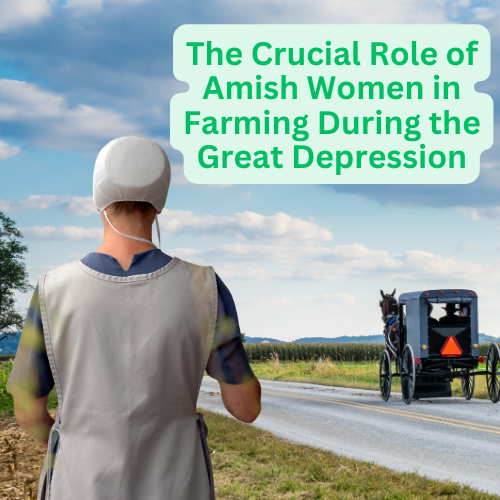Sustainability and Strength: Unveiling the Crucial Role of Amish Women in Farming During the Great Depression
In the heart of Lancaster County, amid the tumultuous era of the Great Depression, a remarkable community stood as an oasis of stability and resilience—Lancaster County’s Old Order Amish. Their unwavering commitment to sustainable farming practices and the integral role of Amish women in this fortitude have emerged as a testament to enduring strength.
A recent publication, “Amish Women and the Great Depression” by Katherine Jellison and Steven D. Reschly, delves into the profound impact of Amish women on the farming landscape during one of America’s most challenging periods. This insightful exploration sheds light on how these women played an indispensable role in steering their community through economic turmoil.
The book uncovers captivating anecdotes, such as the ingenious thriftiness of an Amish family, owning three dozen brooms crafted from homegrown broom corn. Their investment of $9 not only exemplified resourcefulness but sustained their household for years, epitomizing the ethos of maximizing every resource.
What distinguished the Amish from their counterparts was a harmonious synergy in labor—a collaborative effort where men, women, and children worked collectively towards a shared goal. Despite societal perceptions of a rigidly patriarchal labor system, the reality within Amish households showcased a different narrative. Women’s contributions transcended traditional roles, mirroring men’s dedication to the farm’s success.
The U.S. Bureau of Agricultural Economics affirmed the Amish community’s stability through the 1935-36 Study of Consumer Purchases. This study highlighted pivotal factors contributing to their resilience: self-sufficiency in clothing and food production, minimal expenditure on leisure, and a resolute commitment to familial and communal support.
Jellison and Reschly’s exploration uncovers a profound truth—Amish women were not mere “helpers” but pillars of the farming foundation. The sentiments echoed by Lydia Stoltzfus, an Amish woman, resonate deeply. Her candid recollection of toiling through the Depression era encapsulates the unwavering resolve and adaptability ingrained in Amish women for generations.
The book’s profound conclusion underlines how the Amish, steeped in their history and religious doctrines, were inherently equipped to thrive amidst adversity. Their practices and mindset epitomized an enduring commitment to sustainable living long before it became a global concern.
In essence, the resilience of the Amish community during the Great Depression stands as a testament to the invaluable contributions of Amish women, shaping not just their present but also influencing generations to come. Their unwavering dedication to sustainability, mutual cooperation, and relentless work ethic remains a timeless lesson in fortitude and self-reliance.

